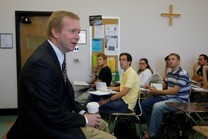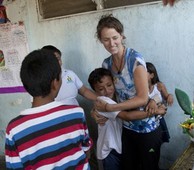Mission Statement
Xavier is a Jesuit Catholic university rooted in the liberal arts tradition. Our mission is to educate each student intellectually, morally, and spiritually. We create learning opportunities through rigorous academic and professional programs integrated with co-curricular engagement. In an inclusive environment of open and free inquiry, we prepare students for a world that is increasingly diverse, complex and interdependent. Driven by our commitment to educating the whole person, promoting the common good, and serving others, the Xavier community challenges and supports all our members as we cultivate lives of reflection, compassion and informed action.
~ Accepted by the Xavier Board of Trustees on December 1, 2017 and re-affirmed for a 5-year period on September 23, 2021.
~~~
Addendum
In order that it properly serve all those who would make use of it, Xavier's mission statement must be memorable and succinct, and it must encompass the breadth and complexity of all we are and do. Invariably, such a statement may strike some as leaving much unsaid, or requiring further clarification. The Mission Statement Task Force offers these thoughts as an invitation to the entire Xavier community to deepen their understanding of our mission statement by considering the concepts that have informed it and the choices of language used to sculpt it.
Fruitful reflections began in 2011-2012 when the mission statement was substantially rewritten for the first time in twenty years. A reconstituted Task Force carefully reviewed it in 2016-2017. A few word and phrasing changes were made to underscore the campus community and to accentuate the Jesuit value of service to others; it was affirmed by the Board of Trustees in 2017 and re-affirmed in 2021 for a 5 year period. We hope this iterative reflective process of our pedagogical, scholarly, and administrative activities will remain a permanent feature of how we use this mission statement.
"Xavier is a Jesuit Catholic university, rooted in the liberal arts tradition."
Xavier is, first and foremost, a Jesuit Catholic institution, embodying the values and commitments articulated especially by the most recent Jesuit Superiors General. From Fr. Pedro Arrupe, S.J. (1965-83) comes the conviction that Jesuit Catholic institutions must be committed to forming "men and women for others." From Fr. Peter Hans Kolvenbach, S.J. (1983-2008) comes a special emphasis on "the service of faith and the promotion of social justice." From Fr. Adolfo Nicolas, S.J. (2008-2016), comes an acknowledgement of the global reach of Jesuit Catholic education: it is to "address important issues touching faith, justice, and ecology that challenge us across countries and continents." Finally, from the current Superior General, Fr. Arturo Sosa, S.J., comes attention to the role of Jesuit universities in offering tools for young people: “Our tradition of serious academic rigor and depth, of involving the whole person in the formation process—engaging not only mind but heart, as well—and steady practice at becoming comfortable with what is not familiar, what is not part of one’s world, of becoming courageous enough to risk encountering the stranger and the unknown—this is Jesuit education.” Together, these central commitments invite us to explore our Jesuit Catholic identity and practice.

Xavier is, of course, a special type of Jesuit Catholic institution: it is a university, an institution of higher education and research offering both undergraduate and graduate degrees. At the heart of this enterprise lives a community of teacher-scholars, dedicated to excellence in the classroom as well as to the advancement of their chosen disciplines. As a Jesuit Catholic university we recognize that excellence in teaching is inseparable from a life of scholarship, into which we invite all our students.
Finally, our education is "rooted in the liberal arts tradition." From the first century of Jesuit Catholic education to our own, the liberal arts have been the center of Jesuit Catholic institutions. At Xavier, this tradition lives in our core curriculum. The liberal arts tradition ensures that students possess a broad knowledge of the world even while pursuing the most specialized subjects that we teach. It requires a continuing reflection on the way any single region of human inquiry connects with other dimensions of inquiry and knowledge. It insists upon thoughtful discourse and openness about all that we hold dear in the pursuit of truth and understanding of the world and our place within it. The liberal arts are so named, in short, because they liberate us to pursue the highest aspirations of our shared humanity.
While there is no core curriculum across graduate programs, housing our graduate programs in an institution that is conversant with and cares about the liberal arts creates a community of enquiry that supports raising questions about the relationship of specific disciplines to the breadth of human knowledge and maintains the emphasis on teaching that is part and parcel of the teacher/scholar model. Students throughout the institution should experience a sense of continuity not only with the intellectual, but also with the moral and spiritual traditions that support open and free inquiry.
"Our mission is to educate each student intellectually, morally, and spiritually."
"We create learning opportunities through rigorous academic and professional programs integrated with co-curricular engagement. In an inclusive environment of open and free inquiry, we prepare students for a world that is increasingly diverse, complex, and interdependent."

First, we state our special approach to learning: we guide our students to educate themselves by challenging them both within and outside the classroom to excel in scholarship, wrestle with new ideas, address problems both great and small, think deeply about the world in all its complexity, and communicate clearly the fruits of their studies. We recognize too that a genuinely effective education must be "integrated with co-curricular engagement." Athletic competition, theatrical and musical performance, participation in student government or professional organizations, opportunities for volunteer work, travel both foreign and domestic; these activities, to name a few, combined with their studies, present to students the chance for significant reflection on their lives and on whom they hope to become, preparing them especially for a life of learning, professional development, and involvement long after they depart Xavier. Learning at Xavier is a transformative process, which, again in keeping with most deeply held Ignatian traditions, seeks to affect the entire person and to promote the integration of the person's intellectual, emotional, spiritual, and moral development.
Commitment to this idea of the university requires "an inclusive environment of open and free inquiry." With this statement, we intend two important points. First, we recognize that our faculty, staff, students, and administrators include a diversity of ethnicities, genders, sexual orientations, religious beliefs, abilities, and ages. Second, we extend this notion of diversity to the exploration and expression of ideas. The idea of diversity, in short, means nothing without "open and free inquiry." Indeed, diversity both of population and of ideas is inevitable, if we wish to "prepare students for a world that is diverse, complex, and increasingly interdependent," that is, the world they live in and will confront more directly upon graduation. Diversity and inclusiveness so understood is central to the freedom a liberal education ought to bring.
The Xavier community is a broad, diverse, and dynamic entity. It includes students, faculty, staff, administrators, alumni, trustees, parents, community members, and external partners. Accordingly, our statement concludes by recalling the core values that energize our mission and unite the community:
"Driven by our commitment to educating the whole person, promoting the common good, and serving others, the Xavier community challenges and supports all our members as we cultivate lives of reflection, compassion and informed action."
A trio of special commitments compels us: to the common good, to the education of the whole person, and to serve our fellow human beings, especially those who suffer injustice. The common good at issue is the human good, a good that embraces individuals, communities, and nations. It therefore sustains our efforts to educate the whole person and to develop lifelong learners called to serve others.
Consequently, each of these commitments directs us first of all to "cultivate lives of reflection." In keeping with the spirit of Ignatius's Spiritual Exercises, reflection seeks a path "to find God in all things" and therewith to discern ways to live and act fruitfully. Compassion cultivates solidarity with humanity, a central principle of Christian virtue and of Catholic social thought. Together, reflection and compassion compel informed action, a thoughtful engagement with the world that seeks to improve the world.
Concluding Thoughts

While education is at the heart of our mission, we aspire to transcend the education of the intellect alone - the simple conveyance of facts, or even the production of competent graduates. Even a more broadly construed intellectual education within the liberal arts tradition, one that teaches students how to think critically is insufficient by itself. Being a Jesuit Catholic university gives us the freedom as well as the duty to attend to the moral and spiritual education of our students. Being a Jesuit Catholic university in the liberal arts tradition commits us to helping our students to wrestle with what morality and spirituality mean - indeed, with what moral code each of our students may adopt and how they will explore their own spiritual lives within their own traditions, as well as in encounters they have with those from other traditions. This sort of education empowers us to challenge students not only intellectually, but also morally and spiritually. In this way, it sustains Xavier's commitment to guiding students as they form - not merely inform - themselves.
Members of the Mission Statement Revision Task Force (2016-17)
Dr. Daniel Otero, Mathematics - Task Force Chair
Ms. Tarisai Chinoda, Student '19
Dr. Cynthia Geer, College of Professional Sciences
Mr. David Johnson, Student Affairs
Ms. Cassandra Jones, Accessibility and Disability Resources
Ms. Deborah Kostoff, Biology
Dr. Michele Matherly, Williams College of Business
Ms. Lea Minniti, Student Support Services
Dr. Debra Mooney, Mission and Identity
Ms. Kelly Pokrywka, Enrollment Management and Student Success
Dr. Timothy Quinn, Philosophy
Mr. Doug Ruschman, Marketing and Communications
Dr. Karl Stukenberg, Psychology
~ Minor modifications to the Addendum have been made since 2012 to keep current.